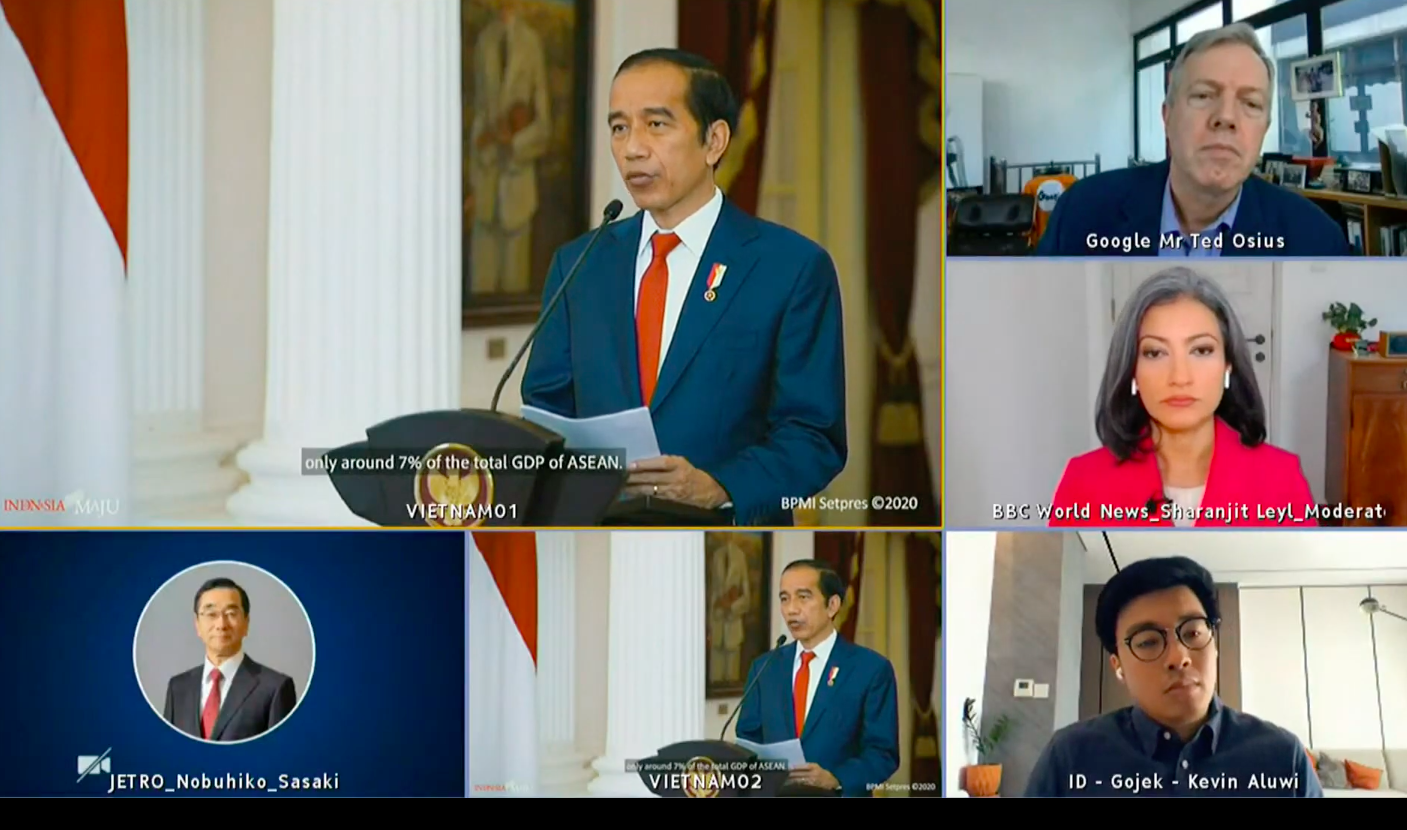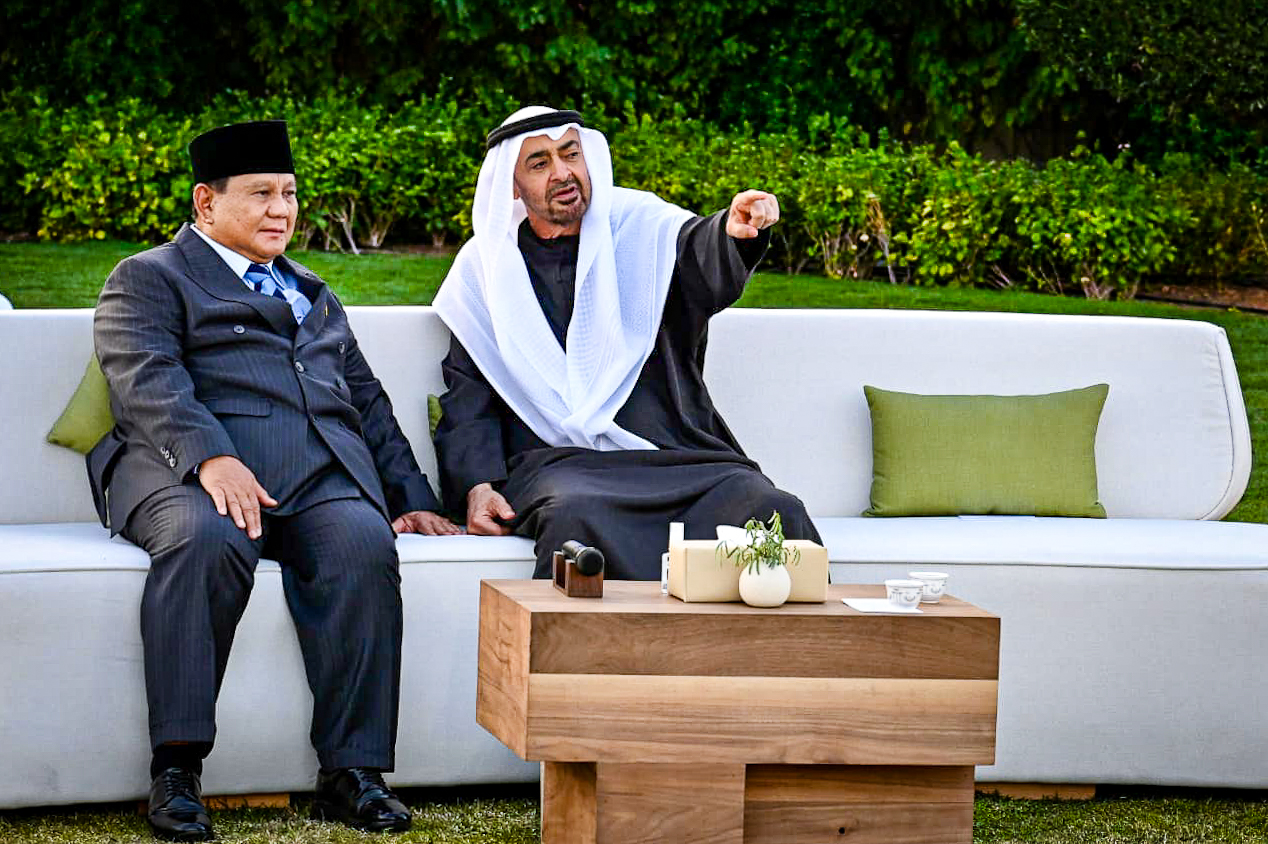President Jokowi: Indonesia Must Speed Up Digital Transformation

Screenshot of President Jokowi when attending ASEAN Business dan Investment Summit virtually, in Hanoi, Vietnam (13/11)
Speeding up digital transformation is pivotal since most businesses and educational activities are carried out virtually during COVID-19 pandemic, President Joko “Jokowi” Widodo has said.
According to the President, the pandemic has caused more than 30 million people living in ASEAN countries at risk of losing jobs and disrupted economic and business sectors.
Amidst this uncertainty, the President underscored the importance of optimism that there are still opportunities, one of which is the development of digitalization.
“During difficult times like today, we believe there remain opportunities and we must remain optimistic. In the midst of this pandemic, we are actually seeing the development of digitalization,” President Jokowi said during the 2020 ASEAN Business and Investment Summit (ABIS 2020) with theme “Digital ASEAN: Sustainable and Inclusive” which was held in Hanoi, Vietnam, Friday (13/11).
The President went on to say that according to the UN Secretary General’s report, cellular networks have reached more than 95 percent of the global population.
As of June 2020, there are 441 million people or around 65 percent of the ASEAN population who are internet users, he added.
“The world’s dependence on digital technology is increasingly higher. More than 1.5 billion children have to study from home, hundreds of millions of people have to work with virtual platforms, online shopping has increased sharply. This condition has certainly provided a great opportunity to accelerate digital transformation,” he said.
The Head of State pointed out that the potential of the ASEAN digital economy, which is estimated to reach US$200 billion by 2025, can only be fulfilled if ASEAN is able to carry out digital transformation, adding that the transformation is indeed followed by a number of challenges that must be anticipated and mitigated.
“Many types of old businesses and jobs have closed. About 56 percent of jobs in five ASEAN countries are at risk of being lost due to automation. In addition, digital gap in ASEAN countries is still very large. Internet penetration has not been evenly distributed across ASEAN countries. Of the 10 countries, only 3 countries have internet penetration above 80 percent,” he said.
Facing those challenges, the Presidenr continued, it is necessary to make various breakthroughs.
“Business as usual is not an option. We must accelerate digital transformation. Moreover, ASEAN digital economic activity is still small, only 7 percent of the total ASEAN GDP,” he said.
Therefore, the President addressed three crucial things in accelerating digital transformation in ASEAN:
First, an inclusive digital revolution. “An inclusive digital revolution requires 3A (Access, Affordability and Ability). We must continue to strive for these three aspects so that the democratization of digital access can work,” he said.
The preparation of adequate and equitable digital infrastructure throughout the region must be the main agenda, not only for urban communities, but also for villages, at affordable prices and followed by increased digital literacy through upskilling and reskilling human resources, he added.
Second, ASEAN must become a big player in a digital-based economy. “Digital economy must be the economic strength of ASEAN. Instead of being only a market, ASEAN must be a big player,” said the President.
The digital economy, he continued, must help MSMEs in the ASEAN region to enter the global supply chain, adding that MSMEs are the backbone of the ASEAN economy because MSMEs represent 89-99 percent of all companies in ASEAN.
“I believe that the acceleration of the digital transformation of MSMEs will encourage the revival of the regional economy. The governments of each ASEAN country must have a bigger share in driving digital transformation. This is important to make ASEAN a digital-friendly region,” he emphasized.
Third, strengthening synergies to create a conducive digital ecosystem in the region. “We must join hands to eliminate barriers to digital trade, build legal certainty, simplify licensing procedures and systems, build synergy regulations on digital trade, e-commerce and digital connectivity, as well as strengthen partnerships between the government and the private sector (PPP) in order to strengthen digital connectivity,” he said.
The synergy must be inclusive, nothing can be left behind, he added.
“That is a requirement if we want to realize ASEAN as a winner in this era of digital transformation. No one is left behind,” the President said.
For the record, the ABIS Meeting was held by the Government of Vietnam and the Vietnam Chamber of Commerce in the series of the 37th ASEAN Summit.
More than 350 participants from business leaders, government representatives and international organizations, both at the venue and online, jointed the event.
Apart from President Jokowi, several other heads of state acted as speakers at this event, including Prime Ministers of Vietnam, Malaysia, Australia, Thailand and China.
The ABIS is an annual business and investment forum organized by the ASEAN Business Advisory Council (ABAC), inviting ASEAN Heads of State, partners, think-tanks, scholars, and CEOs from various business sectors.
The meeting generally discussed global issues aimed at finding solutions to world challenges, especially those affecting today’s business world. (PR of Ministry of Foreign Affairs / UN)
Translated by: Estu Widyamurti
Reviewed by: M. Ersan Pamungkas








